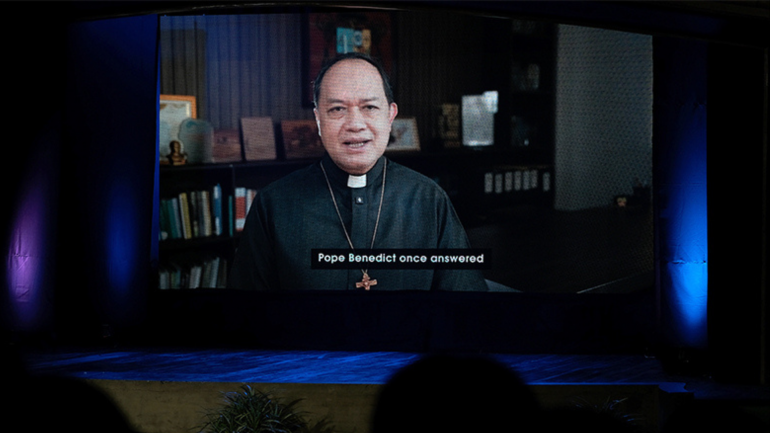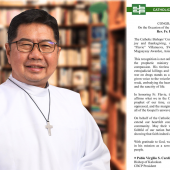Social Action Directors convene for 41st National Assembly in Philippines

The 41st National Social Action General Assembly, organized by Caritas Philippines, brought together over 250 social action workers from 67 dioceses across the Philippines from June 17 to 21.
Held in the Archdiocese of Jaro, Iloilo City, the assembly served as a crucial platform for discussing and advancing the Church's social justice and community empowerment mission.
Catholic Bishops’ Conference of the Philippines President and Kalookan Bishop Pablo Virgilio David delivered a video message, expressing gratitude to the Archdiocese of Jaro and Archbishop Romy Lazo for their hospitality.
He also welcomed the newly appointed Executive Secretary of the Episcopal Commission for Social Action, Justice, and Peace, Fr. Carmelo “Tito” Caluag. He thanked Fr. Antonio Labiao Jr. for his dedicated years of service.
In his message, Bishop David underscored the assembly's theme, "Journeying to Empower Communities in Faith, Love, and Justice," highlighting its importance in promoting the social teachings of the Church.
He emphasized that the main objective of the assembly was to deeply engage with these teachings through various social action ministries across the Philippines.
These ministries include the Ministry for People Deprived of Liberty, the Ministry for Relief and Rehabilitation for Disaster Survivors, the Ministry for the Homeless, the Ministry for Migrants, Itinerants and their Families, the Ecology Ministry, and the Ministry for Extra Judicial Killings Widows and Orphans, among others.
Bishop David discussed the distinction between the Church's motivation for social action and secular ideologies.
He stated, "Our motivation for social action work in the Church is never ideology or any political conviction, but only the love of Christ."
This love, he noted, is encapsulated in the Latin word "Caritas," which represents the implementing agencies of the diocesan commissions on social service and development.
Drawing on Pope Benedict’s insights, Bishop David explored the relationship between faith, love, and justice.
He explained that, according to the Pope, faith is a human response of love to God who loved us first. "We love because we are loved. How can we respond with love to God if we have not been awakened by God's love for us?"
He emphasized that it is God's love revealed in Jesus Christ that urges the faithful to see every neighbor as a brother or sister and to respond with compassion, particularly towards those marginalized in modern society. “Impelled by faith and love, we inevitably get involved in concrete actions for justice,” he added.
The Bishop also addressed the urgency of providing relief and rehabilitation in emergencies, while cautioning against fostering a dependency on aid.
He warned that an "Ayuda culture" or dole-out culture, reinforces patronage politics and undermines just governance that prioritizes the common good. Instead, he advocated for a focus on the dignity of all human beings, created in God's image, and urged participants to immerse themselves in the social teachings of the Church.
This, he argued, would orient them towards effective social action grounded in the principles of justice and the common good. “Dear brothers and sisters, please soak yourselves in the social teachings of the Church, which alone can orient you to the foundations of social action,” he advised.
The Bishop stressed the importance of transforming societal structures, including politics, economics, and culture, in the light of the Gospels and the Church's social doctrine.
"It makes sense to me why in addition to relief and rehabilitation and community development work, we should also reorient our social action priorities towards social change, towards the transformation of societal structures including politics, economics, and culture in the light of the Gospels and the social doctrine," he said, emphasizing the need for structural transformation to achieve lasting justice and equity.
In concluding his message, Bishop David expressed his appreciation for the leadership of Bishop Colin Bagaforo, Chairman of the Episcopal Commission on Social Action, Justice, and Peace, and his Vice Chairman, Bishop Jerry Alminasa.
He acknowledged their energetic leadership and the new directions they are taking in the Church Ministry for Human Development.
The assembly continued with various sessions and workshops designed to empower social action workers with the knowledge and skills to address the pressing social issues facing their communities.
Participants engaged in fruitful discussions, sharing best practices and formulating strategies to enhance their social action initiatives.
Radio Veritas Asia (RVA), a media platform of the Catholic Church, aims to share Christ. RVA started in 1969 as a continental Catholic radio station to serve Asian countries in their respective local language, thus earning the tag “the Voice of Asian Christianity.” Responding to the emerging context, RVA embraced media platforms to connect with the global Asian audience via its 21 language websites and various social media platforms.














